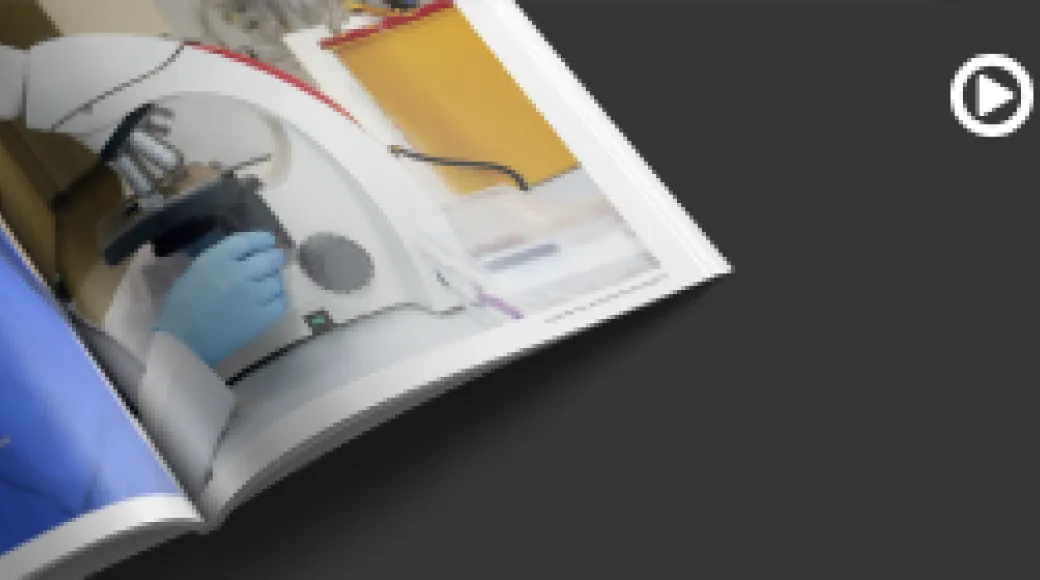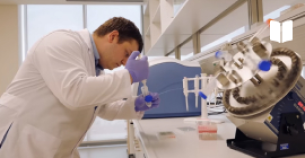Over the last few years, teaching English for Medical Purposes has gained significant importance worldwide. At Acıbadem MAA University, we are at the forefront of this vital educational trend. The School of Medicine employs English Medium Instruction (EMI) for all courses, ensuring that our students receive the highest standard of education in English. During their Phase I education, which encompasses Basic and Clinical Sciences, students engage in Medical English courses for three years.
Our mission is to train physicians who aspire to achieve excellence in all fields of medicine, both nationally and internationally. We approach Medical English from the perspective of medicine and healthcare, while also reinforcing essential academic English skills.
Objectives of the Medical English Program
The aim of our Medical English Program is to empower students to effectively communicate with patients, caregivers, medical colleagues, and academics in English. We support their understanding and use of medical terminology in coordination with their medical studies. Additionally, we emphasize the importance of reading, interpreting, and authoring medical literature, as well as encouraging students to speak at medical seminars and conferences.
Comprehensive Course Content
Our meticulously designed curriculum includes a range of courses and activities aimed at developing our students' proficiency in Medical English. Below is an overview of the course content:
Year 1: MED 133 - MED 134
Medical and Science Terminology: Utilizing MyLab Terminology Pearson for comprehensive learning.
Introduction to Academic Research Writing: Covering essential topics such as paragraph unity and coherence, effective quote integration, inferences and citation, plagiarism, and more.
Ethics Essay Writing: Developing skills for writing on ethical issues in medicine.
Conferences: Learning to convey information concisely through posters and flyers.
Debate: Engaging in ethics debates to foster critical thinking and communication skills.
Work Shadowing: Gaining real-world experience in medical settings.
Year 2: MED 233 - MED 234
Medical and Science Terminology: Continuing the use of MyLab Terminology Pearson for advanced terminology learning.
Career Development: Crafting professional documents such as CVs and statements of purpose.
Becoming a Critical Thinker: Learning to identify and analyze arguments, assumptions, and inferences.
Academic Synthesis Writing: Mastering the art of synthesizing information for academic purposes.
Ethics Case Discussion: Discussing and evaluating ethical cases in medicine.
Abstract Writing: Developing skills to write clear and concise abstracts for research papers.
TEDMED: Engaging with TEDMED talks to stay updated on medical innovations and ideas.
Year 3:
Journal Club: Participating in the meetings to discuss and critique recent medical research articles.
Currently, there are approximately 1500 students enrolled at the Vocational Schools of Acıbadem MAA University, benefiting from a diverse and enriching educational experience. The Vocational School offers three distinct programs: Culinary, Biomedical Device Technology and Computer Programming providing students with specialized training and hands-on skills in these growing fields.
In addition, the Vocational School of Health Services boasts an impressive array of 16 programs, catering to a wide range of interests and professional goals. These programs include Oral and Dental Health, Anesthesia, Pathology, First Aid and Immediate Support Services, among others. This extensive selection ensures that students receive comprehensive education tailored to their specific career aspirations.
Innovative English Language Training
Our English language training is meticulously designed to support students throughout their academic journey. In their first year, students take their general English course online via the ALMS platform, ensuring flexibility and accessibility. This course lays a solid foundation in English, essential for improving the language for further uses.
In the second year, the Academic English Program transitions students to more specialized training. Through asynchronized English courses delivered via audio PowerPoint presentations, students gain proficiency in English for professional purposes. This innovative approach allows students to learn at their own pace while acquiring the language skills necessary for their specific fields.
In today's globalized academic landscape, proficiency in English is not just an advantage—it's a necessity. Our EAP course empowers our students with the essential language skills required to excel in their studies and future careers. From mastering academic writing and reading comprehension to enhancing their presentation and research abilities, this course is tailored to meet the specific demands of their discipline.
Course Highlights:
Customized Curriculum: Focused content that addresses the unique needs of students in Pharmacy, Biomedical Engineering, Molecular Biology and Genetics, Nursing, Nutrition, and Psychology.
Expert Instruction: Learning from experienced educators who specialize in teaching English for academic and professional purposes.
Interactive Learning: Engaging in dynamic activities and discussions that foster a deeper understanding of their subject matter.
Comprehensive Skills Development: Improve their academic writing, critical reading, effective communication, and research techniques.
Class Activities:
The interactive class activities help the students develop a wide range of skills and strategies for both spoken and written English. Activities include:
Discussing Opinions and Questions: Engaging in meaningful conversations with peers to explore diverse perspectives.
Reaching Consensus: Learning to navigate group dynamics and find common ground.
Planning Written Work and Presentations: Mastering the art of organization and delivery.
Solving Problems and Evaluating Approaches: Developing critical thinking skills by tackling complex issues.
Reading, Analyzing, and Evaluating Texts: Enhancing your ability to interpret and critique scholarly works.
Using Scholarly Sources: Learning to cite, quote, and reformulate ideas with academic integrity.
At Acıbadem MAA University, we are dedicated to providing robust English support across various faculties. The Faculty of Health Sciences, encompassing the Nursing, Physiotherapy & Rehabilitation, and Nutrition & Dietetics departments, along with the Psychology and Sociology departments from the Faculty of Humanities and Social Sciences, benefit from our specialized English programs.
While the primary language of instruction in these departments is Turkish, our English courses, conducted five hours per week over three years, aim to elevate students' general English proficiency to the B1 level according to the Common European Framework of Reference (CEFR). Additionally, these courses introduce students to the fundamentals of Academic English, preparing them for future academic and professional endeavors.
Our English courses are designed to be highly interactive, incorporating online components, projects, and presentations. This multifaceted approach ensures that students engage with the material actively, fostering a deeper understanding and practical application of the language.
Tailored English for Specific Purposes
In their final year, students transition to studying English for Specific Purposes (ESP), a course meticulously crafted to meet the specific needs of their respective departments. The ESP course is designed to:
Enhance Professional Communication: Focus on improving English skills within specific professional contexts relevant to each department.
Specialist Vocabulary Acquisition: Equip students with the terminology and jargon unique to their fields of study.
Practical Language Application: Provide opportunities to practice English in real-world scenarios, simulating professional environments to build confidence and competence.
English for Health Management (EHM)
The Health Management Department Intensive English Program aims to equip students with the language proficiency and skills necessary to succeed in the global health management arena. This program ensures that students become effective communicators not only in their academic endeavors but also in their professional lives.
Students in the Health Management Department receive a total of 1176 hours of English instruction alongside their departmental courses. This intensive program is designed to help students reach an advanced level (B2/C1) of English proficiency by the end of four years.
Structure and Intensity of English Courses
1st Year: EHM 101 and EHM 102 - 15 hours per week, 9 credits
2nd Year: EHM 201 and EHM 202 - 12 hours per week, 9 credits
3rd Year: EHM 301 and EHM 302 - 9 hours per week, 8 credits
4th Year: EHM 401 and EHM 402 - 6 hours per week, 6 credits
Experienced Faculty
The EHM English courses are delivered by experienced Turkish and international instructors. This ensures that students receive a high-quality education at both national and international levels.
Educational Content and Approach
The program adopts a student-centered learning and teaching approach that prioritizes language development. It encourages active participation both inside and outside the classroom through social interaction. This method allows students to develop their language skills by practicing and applying them in real-life situations.
Assessment and Evaluation
Various assessment and evaluation methods are used in EHM courses. In alignment with student-centered education, different evaluation techniques such as exams, projects, presentations, quizzes, assignments, and debates are employed to measure the four language skills (listening, reading, writing, and speaking). This comprehensive assessment ensures that students' language abilities are holistically evaluated and developed.
The Academic English Program offers two valuable elective English courses designed to enhance students' language proficiency and prepare them for specific academic and professional contexts. Both courses are taught for 2 hours a week over two semesters, providing a comprehensive learning experience.
English Language Course for Erasmus (ACU 213-212):
This course is tailored for students planning to participate in the Erasmus program. It focuses on improving language skills necessary for studying abroad, emphasizing conversational English, academic writing, and cultural communication. The course prepares students to navigate and succeed in an international academic environment.
English Language Skills for Vocational School (ACU 220-221):
Specifically designed for vocational school students, this course aims to develop practical English language skills relevant to their fields. It covers specialized vocabulary, professional communication, and real-world applications of English, ensuring that students are well-equipped for their future careers in a globalized job market.



